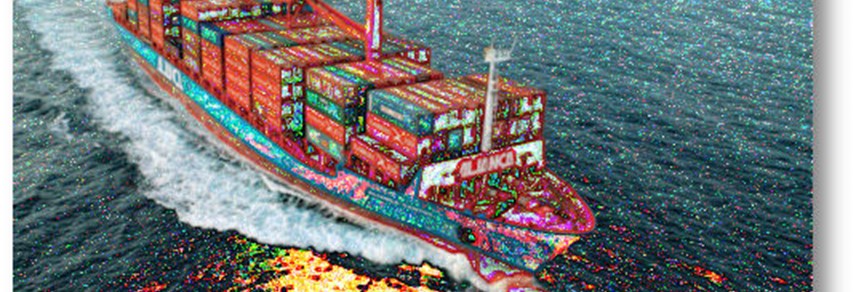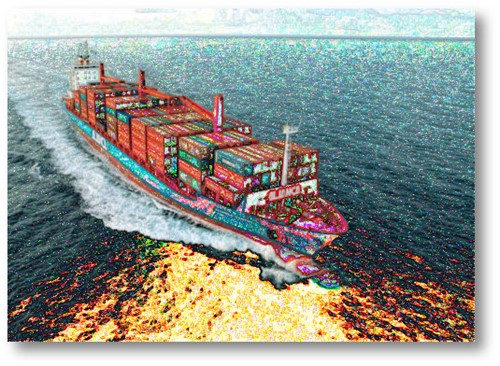
ON THE MAP
Reputation in transport is built on transparency, compliance and internal communications. Brittany Golob explores the sector

It is easy to forget, 13 years into the 21st century, with the world’s geography, knowledge and communications available at the touch of a button, that Great Britain remains what it has always been: an island.
The United Kingdom relies on the shipping industry for 95% of its imports. That accounts for about half a billion tonnes of goods a year, 58,000 full-time jobs, 8.1 million container units and over 650 domestic ports. In personal transport, Transport for London (TfL) records about 12 million trips on its network per day. This ballooned to at least 15 million during the Olympics, a 35% increase to normal summer levels of usage. Similar superfluous data can be found on the websites of logistics providers like UPS, Interlink Express and DHL.
In this complex and vast sector, the typical consumer only sees a company’s outermost facade. For shipping companies or ports, there may be no consumer interaction at all. Thus, reputation is based on internal communications, legal compliance and stakeholder transparency.
Throughout the 19th and 20th centuries making travel accessible and introducing people to new lands and new experiences was the purview of transport and shipping. Now, the world’s cartographers have traversed the planet and planes, trains and automobiles can reach even the most remote locales. Transport and logistics companies now continue that tradition of promoting access through social media.
These companies approach social media with an eye to transparency for customers, but more often, with stakeholders interests in mind.
Klavs Valskov, head of communication and branding at Maersk Line, says the company’s social media strategy centres on a desire to share news, history, legal and logistical developments and photos with its audiences. The container shipping arm of the Maersk Group runs its social media in-house and has a strong presence on everything from Instagram to Weibo, allowing stakeholders worldwide to engage with the company.
“In terms of external platforms and how we use external channels, I think one of the main things for us is to be really trustworthy and not try to push marketing messages,” Valskov says. “We have this credibility and trust when we post things. We don’t want people to doubt whether it’s correct or not and the way to achieve that is to not shy away from the negative stuff.”
TfL owns 20 Twitter feeds for each of its various lines and offices. TfL’s director of news, Stuart Ross, says social media is simply another platform for meeting the needs of its audiences, “I suppose that the key thing is that we try to put our customer absolutely at the heart of what we do, understand what all of our stakeholders want, need and expect from us, and deliver it to them.” Of TfL’s benchmark social media success during the Olympics, Ross adds, “It certainly had an impact on the reputation of Transport for London, we’ve seen that in our own research of customers and other stakeholder groups.”
By maintaining a high level of transparency on digital channels, organisations in the sector can build and maintain trust and improve reputation.
Maersk also finds that transparency is necessary as it often tackles topics like sustainability, ship refitting and energy efficiency. “It shows that we’re accessible,” Valskov says. “We are open and we are not like the shipping industry was years ago. We do things that can be attacked from certain angles, but we are not trying to hide anything.” He notes that shipping is still the most environmentally- friendly means of transport in the world and that Maersk seeks to lessen its carbon footprint for both sustainability efforts and because fuel efficiency induces significant cost reductions.
Sustainability is of concern to the international and national organisations that regulate the transport sector, as well.
On the international level, one of the chief considerations of the UN’s International Maritime Organisation (IMO) is the impact of maritime pollution. The organisation itself was established in 1958, but only found its feet in 1967 when the Torrey Canyon sank, releasing 120,000 tons of oil into the Atlantic Ocean off the coast of Cornwall. The IMO, and its legal committee in particular, seeks to ensure that health and safety and sustainability regulation eliminates the environmental impact such disasters as the Torrey Canyon and Exxon Valdez spills have on the world’s oceans. At the local and regional level, professional bodies like the UK Major Ports Group (UKMPG) and the British Ports Association, act as lobbyists on behalf of the nation’s ports. They are also the primary resource for the shipping industry in health and safety and compliance. Lisa Cagnacci of the UKMPG says the UK’s marine law, and its ports, in turn, are directly impacted by EU regulation. As EU and UK law often differs and overlays each other, she adds that organisations like the UKMPG help individual port companies work through the impact that legislation has and helps them to maintain compliance within this framework.
The IMO, comprised of 170 member states, oversees shipping regulation and maritime law. At the legal committee’s 100th meeting last month in London, Patrick Griggs CBE, former president of the Comite Maritime International, suggested that the IMO and its peers seek to make their regulations more compatible with national and regional law, “This committee should be attempting to produce instruments which states can implement without finding that its terms conflict with their national laws. A draft built on this firm foundation of knowledge of existing national law stands a chance of achieving harmony rather than creating conflict.”
Nick Brown, maritime communications manager at Lloyd’s Register, says this method of governance is preferable, “Most ship owners would want to see international regulation governing shipping rather than a patchwork of national and regional requirements. The shipping industry is one of the few that does have an effective international regime.”
For Lloyd’s Register, the cross-cutting layers of legislation that govern the industry is mirrored in its own stakeholder structure. It is responsible to three audiences: the shipbuilder who wants to construct a good ship, the ship owner who seeks cost efficiency and the regulator who seeks to minimise risk. All of these groups must adhere to local regulations on the part of the port authority, national legislation regarding shipping, EU or other regional governance and the UN’s decisions in the IMO.
Compliance to international regulations in terms of sustainability is in the best interest of shipping companies seeking to maintain positive public perception and the faith of stakeholders.
While shipping, despite the occasional accident, is one of the most energy efficient modes of transport, logistics companies strive to adhere to environmentally friendly policies as well.
Ben Schneider, research director at Edelman Berland, says, “CSR is tied to reputation and trust – the things that make out those companies’ environmental impacts are far greater and far more prevalent to the public eye. You see a lot of paper and a lot cardboard and trucks and planes and those are fossil fuels and all those things make up logistics. As such they carry a big burden and a big opportunity for gaining trust and reputation out of CSR.”
But for such large organisations, internal communications are equally important in ensuring the brand promise is fulfilled and, failing that, there is a sufficient comms solution in place to manage the reputational fallout. Schneider says a considerable infrastructure is necessary in order to manage internal communications.
That infrastructure is present in airline companies with employees in the far-flung airports of the world. It’s present in shipping companies that cooperate with port companies, associations, national, international and regional legislators and their own internal frameworks. It’s present in logistics firms that send packages from central depots to local distribution centres to the recipients’ addresses.
Interlink Express, for one, employs the distro-hub model of package delivery. A network of franchisees that are essentially local businesses receive packages from regional depots. The franchises are overseen by regional managers as part of the layered internal framework that makes up the Interlink organisation. Marketing director Tim Jones says contributes directly to reputation, “Reputation is only based on one thing: to collect when we say we will and to deliver when we say we will. We can only do that when we’re operating efficiently, with the right vehicles, the right sortation plant and delivering within the one hour timeslot. We can do all of that because we have the systems in place. We have the people in the depot network who are invested in it because it’s their own business locally.”
Transport providers take a more consumer- oriented approach to IC, Fishburn Hedges director Rory Scanlan says. Their reputations are built upon delivering quality service and delivering people to their destinations on time. This requires capable communicators on the front lines of the business trained in transmitting the company’s message to consumers while simultaneously maintaining the flexibility to respond in kind to the situation at hand.
This can not only alleviate a customer service problem but can help build the company’s reputation in the long term. Scanlan says, “Internal communications is incredibly important, as are stakeholder relationships and customer communication. They’re all absolutely key, so it is imperative for companies involved in the sector to build up trust with consumers and stakeholders.”
Shipping, too, has it its own unique set of challenges.The typical sailor is at sea for three to six months at a time. Most, the ones that don’t work for giant corporations like Maersk or Shell, spend that time without internet access.
While food and clean water may be inalienable human rights, for the developed world, an internet connection may be nearing that in importance. Carolyn Lewis, a former communications officer with the Merchant Navy Welfare Board who now runs a seafarer welfare project says, “Having access to the internet is almost a human right and it’s crazy that seafarers often don’t have that option.” Lewis’ initiative brings MiFi units (mobile wifi) onto ships in ports around the UK. She works with port chaplains and broadband providers like Three to connect mariners far from home to their loved ones around the world.
Connectivity at sea may be of key interest to internal teams at organisations like Maersk who arm their seafarers with satellite internet connections, which allows not only personal communications, but interaction with the company’s own social media feeds, Valskov says. However, Lewis adds, “It’s hugely complex. I think partly it’s a cost thing, because whilst seafarers are at sea, satellite communications are the only way they can stay connected and the costs of that are quite significant.” She says smaller shipping companies are beginning to recognise the value this would have to seafarers on an individual basis as well as the employee welfare and engagement benefits of connecting their ships.



